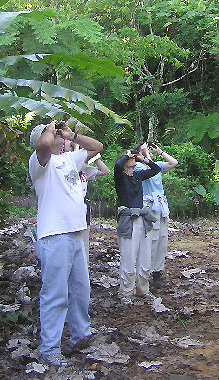
There is an abundance of resources on the topic of ecotourism available on the internet. The following are several examples:
United Nations Environment Programme page on Ecotourism
Center on Ecotourism and Sustainable Development

What Is Ecotourism?
The International Ecotourism Society (IES) defines ecotourism as: "responsible travel to natural areas that conserves the environment and improves the well-being of local people."
The IES requires businesses that join the organization to agree to the following Code of Conduct:
"We agree that ecotourism is responsible travel to natural areas that conserves the environment and improves the well-being of local people, and further agree that we will undertake to adhere to the principles of ecotourism as outlined below:
- Minimize impact
- Build environmental and cultural awareness and respect
- Provide positive experiences for both visitors and hosts
- Provide direct financial benefits for conservation
- Provide financial benefits and empowerment for local people
- Raise sensitivity to host countries’ political, environmental, and social climate
- Support international human rights and labor agreements"
According to the United Nations, the five basic principals required for ecotourism and sustainable travel are:
- Its main motivation is “the observation and appreciation of nature as well as the traditional cultures prevailing in natural areas”
- It contains "educational and interpretation features"
- It is organized "for small groups by specialized and small, locally owned businesses"
- It minimizes negative impacts "upon the natural and socio-cultural environment"
- It supports the protection of natural areas by 1) generating income for host communities; 2) providing alternative employment and income opportunities; 3) increases awareness of the need for conservation of natural and cultural assets.
How can ecotourism help neotropical migratory birds?
Every year, thousands of temperate latitude birders and other nature enthusiasts flock to Central and South America and the Caribbean, particularly during the winter, to experience tropical ecosystems and observe diverse and exotic fauna, especially birds. Those travelers have significant potential to help conserve tropical habitats, not only for native wildlife, but also for North America birds wintering in the tropics. Tropical travel has particularly important implications for bird conservation since widespread habitat loss in the tropics may be a limiting factor for many species of neotropical migrants, including numerous species of birds that breed in Wisconsin.
Ecotourists, including laypeople, casual naturalists, and hard core birders, can directly contribute to conservation of tropical habitats by patronizing tourism operations that provide social and environmental benefits. Ecolodges that actively support habitat protection can have a positive impact on conservation. Those that employ local citizens and keep business revenue “in-country” magnify their positive conservation impact by providing economic incentives for resource protection. Additional benefits, including conservation of core environmental services (flood control, drinking water, provision of forest products, etc.) can result. Regardless of the motivation for travel, tourists often return from Latin America with an increased awareness of environmental issues in the tropics, and are thus more likely to support conservation efforts “south of the border”.
Ecotourism is considered the fastest growing market in the tourism industry, according to estimates from the World Tourism Organization in 2000, with an annual growth rate of 5% worldwide. Spending on ecotourism represents an estimated 6% of the world gross domestic product and 11.4% of all consumer spending. This is a significant influx of money and attention for countries that frequently are poor and in need of economic development.
WBCI encourages Wisconsin birders to be educated ecotourists by patronizing establishments providing significant benefits both to the natural environment and local communities.